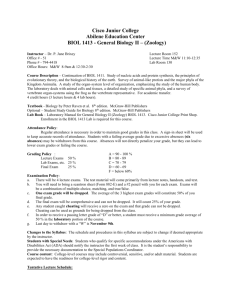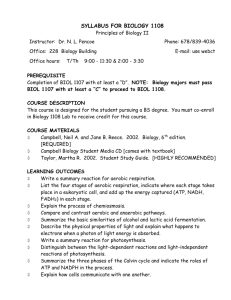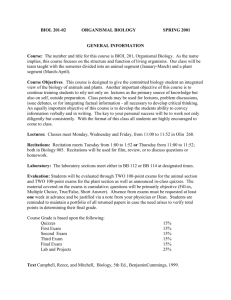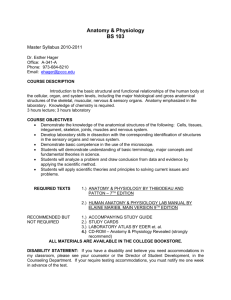general course information for biology 124 mammalian physiology
advertisement
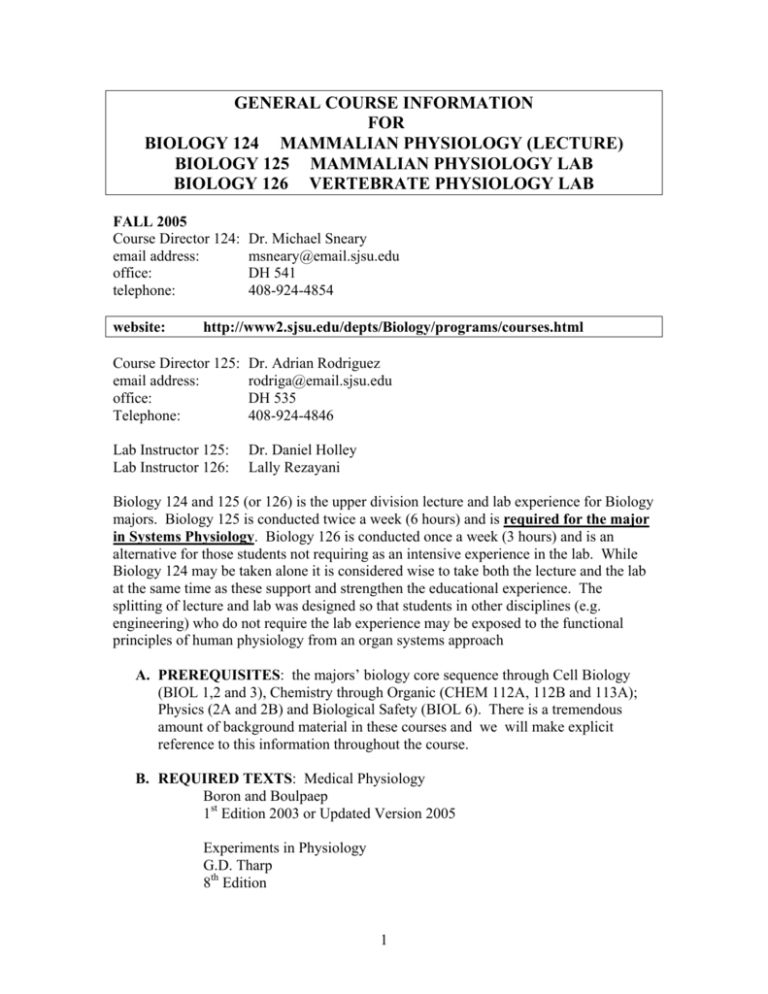
GENERAL COURSE INFORMATION FOR BIOLOGY 124 MAMMALIAN PHYSIOLOGY (LECTURE) BIOLOGY 125 MAMMALIAN PHYSIOLOGY LAB BIOLOGY 126 VERTEBRATE PHYSIOLOGY LAB FALL 2005 Course Director 124: email address: office: telephone: website: Dr. Michael Sneary msneary@email.sjsu.edu DH 541 408-924-4854 http://www2.sjsu.edu/depts/Biology/programs/courses.html Course Director 125: email address: office: Telephone: Dr. Adrian Rodriguez rodriga@email.sjsu.edu DH 535 408-924-4846 Lab Instructor 125: Lab Instructor 126: Dr. Daniel Holley Lally Rezayani Biology 124 and 125 (or 126) is the upper division lecture and lab experience for Biology majors. Biology 125 is conducted twice a week (6 hours) and is required for the major in Systems Physiology. Biology 126 is conducted once a week (3 hours) and is an alternative for those students not requiring as an intensive experience in the lab. While Biology 124 may be taken alone it is considered wise to take both the lecture and the lab at the same time as these support and strengthen the educational experience. The splitting of lecture and lab was designed so that students in other disciplines (e.g. engineering) who do not require the lab experience may be exposed to the functional principles of human physiology from an organ systems approach A. PREREQUISITES: the majors’ biology core sequence through Cell Biology (BIOL 1,2 and 3), Chemistry through Organic (CHEM 112A, 112B and 113A); Physics (2A and 2B) and Biological Safety (BIOL 6). There is a tremendous amount of background material in these courses and we will make explicit reference to this information throughout the course. B. REQUIRED TEXTS: Medical Physiology Boron and Boulpaep 1st Edition 2003 or Updated Version 2005 Experiments in Physiology G.D. Tharp 8th Edition 1 C. COURSE READER The course reader is required. It includes information for both lecture and lab. The reader may be purchased from the BSA (Biology Students Association) D. GRADING BIOL 124 4 midterms 100 points each Final Exam 200 points TOTAL 600 points BIOL 125 Exams (4) Lab Report Discussion Subjective TOTAL 100 points each 075 points 025 points 025 points 525 points BIOL 126 Midterm (1) Final Lab Report Discussion Subjective TOTAL 100 points 100 points 075 points 025 points 025 points 325 points Exams will be a combination of true-false, multiple choice, short answer and fill in the blank space. Note old exams will be made available on the course website or on reserve in the library. The lecture exams will be administered in DH 135. Please sit in alternate seats during the exam. Lab exams will be administered in DH 440. Bring a Scan-Tron 882 form and a #2 pencil to each exam. Grades in Biol 124, 125 and 126 will be based upon the class distribution around the mean and the standard deviation. Make-Up Exams: Make-Up exams are seldom given in Biology 124 and only for very good and verifiable (e.g. a written medical excuse) reasons. If you must miss an exam, then call 924-4854 and leave a clear message. Lab exams are not possible to recreate as they include practical questions (stations). Lab exams will, of course, be given twice in the week and so it may be possible, if for instance you are sick, for you to take the exam in the later lab. Nevertheless, you must have a written verifiable excuse to do so. Exam Grievances: All complaints concerning the grading of a lecture or lab exam must first be directed to the person who graded the page in question. That person’s name will appear on the posted key. If the complaint is with the ScanTron, then contact the course director (Rodriguez- lab exams; Sneary- lecture 2 exams). If you do not obtain satisfaction with your grievance from the grader then contact the course director directly. All grievances to the course director must be submitted in writing with adequate documentation to support your grade change. E. WITHDRAWALS: Drops (w/o “W”) are permitted until September 13th. After this date a petition to drop is accepted only for compelling reasons. The petition to drop MUST include documentation and will be reviewed by someone other than the course director. Students wishing to drop must complete the appropriate drop forms and obtain the required signatures. Failure to do so will result in a "U" grade that equals an "F". F. ACADEMIC INTEGRITY: Your own commitment to learning, as evidenced by your enrollment at San José State University, and the University’s Academic Integrity Policy requires you to be honest in all your academic course work. Faculty are required to report all infractions to the Office of Judicial Affairs. The policy on academic integrity can be found on the University website. G. DISABILITY: If you need course adaptations or accommodations because of a disability, or if you need special arrangements in case the building must be evacuated, please make an appointment with me as soon as possible, or see me during office hours. Presidential Directive 97-03 requires that students with disabilities register with DRC to establish a record of their disability.” . H. LABORATORY: (BIOL 126 students should refer to the separate handout for specific information concerning Lab Reports and Discussions). Note that some of the following sections apply to BIOL 125 ONLY. General Comments and Objectives (125/126) The principal reason for laboratory work in physiology, as in other disciplines, is to become personally involved with the subject. Working with one’s hands in a thoughtful and disciplined manner is often more effective than formal lectures or textbook reading assignments in developing true understanding. Please note that during laboratory introduction sessions, verbal modifications to handouts and the lab manual are sometimes given, as well as important supplemental information and advisories not listed in the above. An important laboratory objective is for you to learn to integrate information both verbal and written when performing the lab units. The knowledge of function of normal living organisms comes largely from laboratory investigation. Ideally, the laboratory exercises will enable you to demonstrate to your own satisfaction some of those concepts of physiology derived by your predecessors using similar procedures. Frequently, this ideal is not achieved, but this of itself may be of value. One often gains the impression from lectures and texts that physiological concepts are hard, fast rules that always apply. You will find, however, that such rules are statistical concepts that may 3 apply in general but cannot always be demonstrated in each experiment. An appreciation of the nature and extent of physiological variation will be an important part of your understanding of physiology. Another aim of the laboratory is to introduce you to some of the equipment that we use in the physiology laboratory. These include the cathode-ray oscilloscope, the polygraph, electronic simulators, and electronic amplifies and transducers. You can only learn the detailed function of these instruments by using them. Therefore we do not expect you to become expert in their use the first day nor even during the first few exercises. However, it is important that you familiarize yourself with these instruments and their capabilities. This can be done with the aid of texts, handouts and with the aid of instructors in the laboratories. It is essential that every student participate in this task. Do not leave this to one “techie” person in your lab group. Use of Animals (125/126) Physiology is concerned with the functions of living organisms and of necessity the material studied in this course must be alive. Invasion of the living animal is not a right but a privilege, one that can be granted only if certain moral and ethical responsibilities are understood and accepted. The animals with which you will work are sentient beings; they can be used only if extreme care is taken to assure that they are handled gently and feel no pain. It will be necessary to sacrifice the lives of many animals. The taking of life should be done with high purpose. In this case, the knowledge and experience which you gain. All procedures involving animals have been rigorously reviewed by the institutional Animal Care and Use Committee, and comply with San Jose State University Academic Senate Policy S87-3, The Use of Animal Subjects. In fact, the Animal Care staff at SJSU will be a visible and integral part of our animal labs. We encourage you to interact with them and to feel comfortable to discuss any topic or procedure with them or with your instructors. We want you to understand all aspects of work in the physiology lab. Laboratory Groups (125/126) For many of the laboratories you will work in a group. The groups will consist of four people maximum (6 groups per lab) located at the ends of each laboratory counter. This arrangement helps everyone and each person will learn more from the labs. Inter-table interaction is strongly recommended. If your set-up is not working then check with another table that is getting results. Be helpful to one another, everybody will be better off by semester’s end. Each group is responsible for seeing to it that their area is left cleaner than it was found. Lab Exams (125/126) There will be four laboratory exams (a midterm and a final in BIOL 126). The exams are not comprehensive. The exams are a combination of true-false, multiple choice, short answer and fill-in. They may also include “practical” questions such as the identification of anatomical structures and histological 4 slides, data interpretation or questions involving instrumentation. There will not be a comprehensive lab final. Lab Reports and Discussion of Data (125/126) Each student must turn in one formal lab report (see “Format for Laboratory Reports” handout). Several labs are designated as acceptable for reports. No two students from the same group may turn in a report on the same lab. A sign-up sheet will be made available during the second week of labs. You must turn in a report on the lab that you signed up for unless you have prior approval from the instructor. You are required to make an oral presentation of your data and the physiology involved during the laboratory period that is designated for discussion of your lab. These should be limited to 10-20 minutes per person. Note that several people will be discussing the same lab and that multiple labs will be discussed on the same day. Those individuals discussing the same lab should meet prior to the discussion period to coordinate their activities. Lab reports are due two weeks after the discussion noted above. Late reports will be penalized 1 point/day thereafter for a total late assessment of minus 10 points possible. It is mandatory that each group have their data worked up (i.e. tabulated, calculated) and ready to present on the discussion day for the lab in question. Failure to bring data to lab or have it ready to present in an organized fashion will result in the loss of subjective points. Lab Subjective Grade (125/126) Everyone starts out with 25 subjective points. Some ways to lose points include: 1) continue to violate lab procedures or rules once you have been warned; 2) in any way disrupt the labs (this includes coming late to lab) 3) not show proper care for instruments 4) leave lab work areas or equipment in disarray or a mess 5) treat an experimental animal in a non-humane manner 6) demonstrate gross lack of preparation 7) failure to bring data that you have collected for presentation during a discussion lab. Absolutely no eating, drinking or smoking in the labs (DH 440, 441). This is a health issue. A violation will also result in the loss of subjective points. Clean Up (125/126) Wash all glassware, including test tubes, surgical instruments etc in soap (not hand soap) and water. Rinse thoroughly and make a final rinse with deionized water. Leave glassware inverted on a drying rack or on paper towels. Instruments must be dried off completely so they do not rust! Instrument kits must be inventoried to be certain that each contains all of the appropriate instruments. Your instructor will check this at the end of the lab. Clean off the lab tables with damp towels or a sponge. 5 Turn off or unplug all electrical equipment. Be sure that electrical equipment is wiped off with a damp towel should they get soiled (unplug first). In the blood labs, clean micropipette on the suction manifold provided with pipeting tips pointing up. Apply cleaning solutions in the following order: 1) deionized water 2) bleach (sodium hypochlorite) 3) deionized water 4) methanol 5) acetone (allow to thoroughly dry before removing from the manifold) Clean all electrode paste off of the skin electrodes immediately after using. For best results use warm water and a test tube brush. Also rinse these with deionized water. When using anatomical models be sure that they are reassembled as found before you leave the lab. Leave the lab as found (think of others using it after you). It is not permitted to attend a different lab section than you were assigned to unless you have a compelling reason and prior approval for both laboratory instructors involved. It is to your benefit to keep a neat, organized lab notebook. Include observations and data collected and bring it to every meeting of your laboratory section, especially to the discussions. This will make it much easier to study for lab exams. Notebooks will not be graded or collected by the instructors. Note that a lab fee has been collected for this course. I. TAPE RECORDERS Taping in lecture is allowed but not recommended. Your time is much better spent reading rather than rehashing material that you have already heard before. Your level of attention in lecture may also decrease if you know that you can always “get it later” from the tape. J: PLEASE NOTE: UNIVERSITY AND DEPARTMENT GUIDELINES REQUIRE A SERIOUS AND COMPELLING REASON TO DROP A COURSE. GRADES ALONE DO NOT CONSTITUTE REASON TO DROP A COURSE. (SEE UNIVERSITY GUIDELINES IN THE CATALOG). 6 K. ANIMAL FACILITY REGULATIONS (125/126) 1. General guidelines for animal research require that care be taken during all phases of experimental work to minimize trauma to the subject animal. a. use anesthesia or analgesia whenever possible b. avoid undue or rough handling, loud noises or temperature extremes c. do not perform surgical procedures (including sacrifice or euthanasia) in the same area where other animals are being housed d. make sure of your technique before animal work begins e. report any unexpected clinical symptoms (watery eyes, loose feces, scabs or infected wounds, unusual behavior, etc) to your instructor, the animal technician or her supervisor 2. Unauthorized (non-classwork or research) use of animals within the facility is prohibited. All experimental procedures must be cleared with your instructor, the animal technician or her supervisor. 3. All cages removed from the facility must be signed out on boards provided in each room of the facility. 4. All animals removed from cages and any experimental procedures (blood withdrawal, injections etc) performed must be indicated in appropriate places on the “I.D. Cage Card”. The cage card is each animal’s medical history. 5. Dead animals must be placed in plastic bags provided in each room and disposed of in proper containers. If death was unexpected, inform animal technician or supervisor of circumstances. 6. Animal facility rooms are closed at certain posted times during the day for routine maintenance. Special arrangements for access during these times may be made PRIOR to the date needed. Contact either the animal technician or her supervisor. 7. Clean up surgical area after use. Violation of this regulation will mean immediate forfeiture of animal facility privileges. Due to increased use of laboratory animals in biology classes and the limited space available for housing and work areas, all procedures must be performed in an expedient manner. This is necessary to avoid conflicts in scheduling and unnecessary congestion. 7


